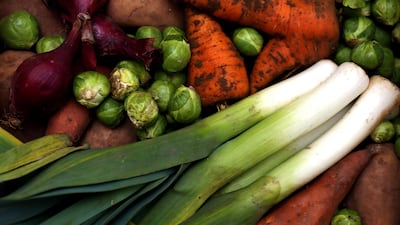Plant-based and vegetarian diets may play a significant role in reducing the risk of Covid-19, a study has found.
Research, published in the journal BMJ Nutrition Prevention and Health, concluded that the incidence of Covid was 39 per cent lower among people who ate a plant-based diet than among those who ate meat.
The findings highlight the importance of dietary habits in influencing the incidence of infectious diseases.
A team led by Julio Cesar Acosta-Navarro, a professor in the school of medicine at Sao Paulo University, studied a group of 702 volunteers.
"The higher the consumption of plant-based foods, the greater the protection," Dr Acosta-Navarro told The National.
Participants were divided based on their diets between omnivorous and predominantly plant-based.
The latter category consumed more vegetables, legumes, and nuts, and less or no dairy and meat products. They included vegans (who eat no animal products), vegetarians (who consume eggs and dairy products) and flexitarians (who ate meat less than three times a week.)
There were no significant differences in sex, age, or vaccination uptake between the two groups.
However, the plant-based group generally had higher education levels and lower rates of medical conditions and physical inactivity.
Impact on Covid-19 infection rates
Of the total participants, 47 per cent reported having had a Covid-19 infection.
The incidence was notably higher among omnivores (52 per cent) compared to those with plant-based diets (40 per cent).
The duration of symptoms didn't differ significantly between the groups, but omnivores were more likely to experience moderate to severe infections.
After adjusting for factors including weight, pre-existing medical conditions, and physical activity levels, researchers noted no overall difference in symptom severity.
But those following a predominantly plant-based or vegetarian/vegan diet were 39 per cent less likely to become infected than the omnivores, researchers concluded.
"The immune system utilises a range of defense mechanisms to combat infections," Dr Acosta-Navarro said.
"Therefore, it is necessary to have an adequate amount of antioxidant enzymes, vitamins and peptides. Without them the capability of the immune system will be jeopardised.
"Plant-based dietary patterns are rich in antioxidants, phytosterols and polyphenols, which positively affect several cell types implicated in immune function and exhibit direct antiviral properties.
Creative dishes to sample this Veganuary – in pictures
"Vegetarians and those on plant-based diets are at reduced risk of chronic diseases of high morbidity and mortality, including ischemic heart disease, Type 2 diabetes, hypertension, certain types of cancer, and obesity, the same conditions that were proved to be risk factor for Covid-19," Dr Acosta-Navarro said.
Shane McAuliffe, senior visiting academic associate at NNEdPro Global Institute for Food, Nutrition and Health – who was not involved in the study – acknowledged the findings but cautioned that is was an area “that warrants more rigorous and high-quality investigation.”
Global rise of plant-based eating
Once viewed as a niche lifestyle choice, plant-based and vegetarian diets have gained momentum.
The terminology shift from “vegan” to “plant-based” around the mid-2010s marked a significant change in attitudes, broadening the appeal of these diets.
The availability of plant-based options has dramatically improved over the past decade in mainstream grocery stores and restaurants.
Sales of plant-based alternatives to meat and dairy foods surpassed $29 billion in 2020 and are projected to reach $162 billion by 2030.
This represents a significant portion of the global protein foods market.
Major companies, including Kroger, Nestlé, and Unilever, are developing plant-based products.
The number of vegans in the US surged from 290,000 in 2004 to almost 10 million in 2019.
The UK saw a 360 per cent increase in vegans over the decade to 2016.
In Portugal, vegetarianism grew by 400 per cent between 2007 and 2017, with laws implemented to offer vegan options in government facilities.
Asian countries including China are also encouraging reduced meat consumption for health and environmental benefits.
Australian food products with vegan claims rose by 92 per cent between 2014 and 2016.


